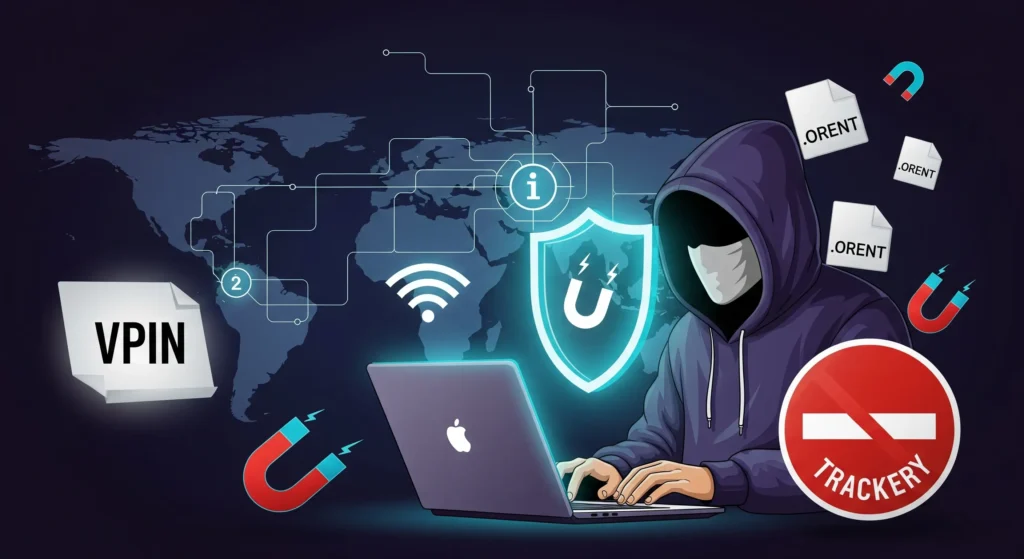
Have you ever downloaded a torrent and immediately worried about getting caught or exposing your real IP address? You’re not alone. Millions of users turn to VPNs for torrenting—but are they enough to keep you completely anonymous?
This guide dives deep into how to torrent safely using a VPN, what risks you’re avoiding, and which providers truly protect your privacy. Whether you’re downloading open-source software or checking out public-domain movies, read on to stay protected and informed.
Table of Contents
Why Use a VPN for Torrenting?
Torrenting, while not inherently illegal, raises red flags due to the high incidence of copyright infringement. Using a VPN (Virtual Private Network) can mask your IP address, encrypt your traffic, and reroute it through secure servers, offering:
- Anonymity from ISPs and surveillance
- Access to geo-blocked or censored sites
- Reduced risk of DMCA notices or bandwidth throttling
- Protection from malicious peers in torrent swarms
Still unsure why VPNs matter when torrenting? Let’s break it down.
The Risks of Torrenting Without a VPN
If you’re torrenting without a VPN, you’re exposing much more than you think:
1. Your IP Address Is Public
When connected to a torrent swarm, your IP is visible to every peer. Anyone can track you—including your Internet Service Provider (ISP), copyright watchdogs, or malicious users.
2. Legal Consequences
Torrents associated with pirated content can result in DMCA takedown notices, lawsuits, or, in some countries, hefty fines or criminal charges.
3. Throttling and Monitoring by ISPs
ISPs often monitor high-bandwidth activities. They can slow your connection just because they detect torrent traffic—even if you’re downloading legal files.
How VPNs Keep You Safe While Torrenting
1. Encrypting Your Internet Traffic
VPNs use military-grade encryption (AES-256) to scramble your data, making it unreadable to anyone who might intercept it.
2. Hiding Your IP Address
Your real IP is hidden and replaced with the IP of the VPN server. To others in the swarm, you appear as a user from another region or country.
3. Built-in Kill Switch & Leak Protection
Top-tier VPNs offer a kill switch, which disconnects your internet if the VPN drops unexpectedly—ensuring you’re never exposed. DNS and WebRTC leak protection further enhance your anonymity.
Best VPNs for Torrenting (Tested & Trusted)
Not all VPNs allow torrenting—or do it well. Here are some of the best options based on speed, privacy laws, and torrenting support:
1. NordVPN
- Based in Panama (privacy-friendly)
- AES-256 encryption, strict no-logs policy
- P2P-optimized servers
- Onion Over VPN and Double VPN for extra security
2. ExpressVPN
- Ultra-fast speeds across 94 countries
- No mandatory data retention laws (British Virgin Islands)
- Excellent mobile & desktop apps
3. Surfshark
- Affordable with unlimited device connections
- Includes Camouflage Mode to hide VPN use from your ISP
- CleanWeb blocks ads and trackers
4. Mullvad
- Truly anonymous: no email or name needed to sign up
- Accepts cash and cryptocurrency
- Open-source clients and strong encryption
Pro Tip: Avoid free VPNs. They often log data, sell bandwidth, or throttle speeds, exposing you rather than protecting you.
Features to Look For in a Torrent-Friendly VPN
Before choosing your VPN for torrenting, ensure it includes:
- Zero-logs policy: Especially outside the 5/9/14 Eyes surveillance alliances.
- P2P Support: Not all VPNs allow torrent traffic.
- Kill Switch: Disconnects the internet if the VPN connection drops.
- High Speeds: Look for 1 Gbps+ servers for smooth downloads.
- Security Protocols: Prefer OpenVPN, WireGuard, or IKEv2.
How to Torrent Safely – Step-by-Step Guide
Step 1: Choose a Secure VPN
Install a trusted VPN service that supports torrenting. NordVPN or Surfshark are user favorites.
Step 2: Connect to a P2P Server
Use servers marked “P2P” or “Torrenting” in the VPN app. These are optimized for high-speed uploading/download.
Step 3: Turn on Kill Switch + Leak Protection
Enable these features in VPN settings to ensure full protection.
Step 4: Use a Trusted Torrent Client
Apps like qBittorrent or Transmission are open-source and secure. Avoid adware-laden clients like uTorrent.
Step 5: Download from Reputable Trackers
Stick to legal torrents or well-known trackers like:
- Public Domain Torrents
- Linux Tracker
- Internet Archive
Step 6: Test for IP and DNS Leaks
Use tools like ismyvpnworking.online or dnsleaktest.com to ensure your real IP isn’t exposed.
Is VPN Torrenting Legal?
Using a VPN to torrent isn’t illegal in most countries. However, downloading copyrighted material without permission is.
Let’s break it down:
- Legal Use Case: Downloading a Linux distro or Creative Commons content.
- Illegal Use Case: Downloading the latest Hollywood movie via The Pirate Bay.
Some countries outlaw VPN use entirely (e.g., China, North Korea), while others monitor torrent activity aggressively, like in the U.S., Germany, and the U.K.
Always check local laws before torrenting, even with a VPN.
Final Thoughts: Staying Anonymous While Torrenting
Torrenting isn’t going anywhere—but neither are the risks associated with it. Using the right VPN is not just recommended, it’s essential if you care about your privacy, security, and legality.
Take your time to choose the best VPN, enable key features like the kill switch and leak protection, and stay informed about what you’re downloading.
By following the steps above, you can enjoy torrenting without worrying about prying eyes, throttled speeds, or legal headaches.